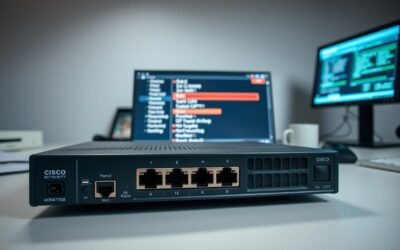What if your next career move could boost your earnings while shaping the future of digital connectivity? For professionals in network roles, credentials like the CCNA aren’t just letters on a résumé—they’re keys to unlocking salaries between $75,319 and $87,000 in the U.S. With networks powering everything from hospitals to smartphones, skilled experts are in high demand, and this certification often bridges the gap between ambition and opportunity.
But numbers alone don’t tell the whole story. Whether you’re eyeing roles like network administrator or system engineer, location and specialization play huge roles in earning potential. San Jose professionals, for example, average nearly $94,500 annually, while those in Washington, D.C., hover around $83,000. Bonuses and incentives add another layer, with some earning over $8,000 extra yearly.
This article isn’t just about data—it’s about your path forward. We’ll break down regional trends, compare career paths, and share insights to help you make informed choices. Let’s dive into what 2024 holds for networking careers.
Key Takeaways
- U.S. salaries for certified network professionals range from $75k to $87k, with bonuses adding up to $8k annually.
- Location matters: Cities like San Jose offer nearly $94,500, while Washington, D.C., averages $83,000.
- Roles like system engineer with this credential can earn over $121,000 per year.
- Global demand remains strong, with over 4 million Cisco-certified professionals worldwide.
- Specializing in high-impact areas can significantly boost long-term earning potential.
Starting the Conversation: Why CCNA Certification is a Game-Changer
There’s a moment when everything clicks—when late-night study sessions turn into career-defining opportunities. Years ago, I sat at my kitchen table, staring at router configurations that might as well have been hieroglyphics. The frustration was real. But pushing through those early challenges taught me something: mastering foundational networking skills isn’t just about passing exams—it’s about building confidence to solve real-world problems.
A Personal Journey into Networking
I remember the first time I configured a live network. My hands trembled as I connected cables, half-expecting alarms to blare. Instead, the quiet hum of success echoed—a VLAN finally communicating. That hands-on lab experience, fueled by the CCNA’s updated focus on automation and cloud integration, reshaped my career trajectory.
Early on, mentors told me certifications were just “alphabet soup.” But here’s what they missed: credentials like this signal grit. They show you’ve wrestled with IPv6 complexities and emerged ready to adapt. When recruiters noticed my updated profile—now aligned with Cisco’s evolving standards—interviews shifted from “Do you know basics?” to “How would you optimize our infrastructure?”
Today’s tech landscape rewards those who blend foundational knowledge with specialties like security or cloud management. Whether you’re troubleshooting a small business network or designing enterprise systems, that initial leap—the late nights, the lab simulations—paves the way. Let’s explore how these skills translate into tangible opportunities next.
CCNA Certification Salary: Key Data and Trends for 2024
Numbers don’t lie—they tell the story of opportunity. In 2024, professionals with validated networking expertise see their skills reflected in competitive compensation packages. Let’s unpack what this means for your career trajectory.
What the Numbers Reveal About Your Earning Potential
Recent CyberSeek data shows U.S. pay ranges between $75,319 and $87,000 for roles requiring this credential. But here’s the twist: cities like San Jose push averages to $94,526. Why? Tech hubs prioritize hands-on skills in automation and cloud integration.
Bonuses sweeten the deal. Many report yearly incentives over $8,000—equivalent to a free certification renewal. Experience matters too. Entry-level roles start around $53,000, while senior engineers can surpass $116,000.
Understanding U.S. Salary Benchmarks and Global Comparisons
Location isn’t just about geography—it’s about demand. Barnstable Town, MA, and Santa Cruz, CA, outpace national averages by 15-20%. Meanwhile, global markets like Germany and Australia offer similar ranges, adjusted for local economies.
Payscale insights reveal a pattern: specialists with hybrid skills in security or wireless networks earn 12-18% more. This isn’t just a job—it’s a strategic play. As networks evolve, so do the rewards for those who keep pace.
Ready to explore where these numbers could take you? Let’s map out the roles turning data into paychecks next.
Job Roles and Career Paths for Cisco Certified Professionals
Your Cisco credentials open doors to roles that shape how businesses connect and protect their data. From maintaining daily operations to designing secure cloud architectures, your expertise becomes the backbone of modern tech infrastructure. Let’s explore paths that align with your ambitions.
Exploring Opportunities as a Network Administrator
As a network administrator, you’ll troubleshoot connectivity issues and safeguard data flow. Industry surveys show 72% of these roles prioritize Cisco-certified candidates. Day-to-day tasks include:
- Configuring routers and switches
- Monitoring network performance
- Resolving security vulnerabilities
Pro tip: Strengthen your profile with automation training. Platforms like Cisco’s DevNet offer free labs to practice scripting workflows.
| Role | Key Responsibilities | Avg. Salary (U.S.) |
|---|---|---|
| Network Administrator | Maintain LAN/WAN systems | $60k–$90k |
| Systems Engineer | Design server architectures | $90k–$140k |
| Network Engineer | Optimize enterprise networks | $100k–$150k |
Venturing into Cloud Networking and Cybersecurity Roles
Cloud adoption has surged by 41% since 2022, creating demand for professionals who bridge networking and virtualization. Many transition into roles like:
- Cloud infrastructure specialist
- Security operations analyst
- IoT network designer
Actionable step: Pair your Cisco skills with AWS or Azure certifications. Job boards show hybrid cloud roles offering 18% higher pay than traditional positions.
Ready to see how geography influences these opportunities? Let’s map out regional trends next.
Navigating Regional and Global Salary Variations in Networking
Where you work can be as crucial as what you know. While technical expertise forms your foundation, geography often determines how that knowledge translates into earnings. Let’s explore how your location shapes opportunities in this dynamic field.
Salaries in U.S. Tech Hubs and Major Cities
In cities like San Francisco, professionals earn 24% more than the national average—over $103,000 yearly. Los Angeles and Dallas follow closely, with averages near $95,000 and $87,000 respectively. High demand in tech-driven markets drives these numbers, but remember: a $100k salary in Silicon Valley doesn’t stretch as far as $85k in Austin.
California’s statewide average sits at $83,077, reflecting both thriving tech scenes and steep living costs. Meanwhile, mid-sized cities like Raleigh offer competitive pay with lower expenses—a balance worth considering if relocation is an option.
International Comparisons and Trends in the Networking Field
Globally, Switzerland leads with averages near $104,000, while Germany and the UK range between $65,000 and $78,000. These figures often include robust benefits like healthcare and pensions, which aren’t always visible in base pay.
Three factors create these disparities:
- Industry concentration: Financial hubs like Zurich prioritize secure networks
- Experience premiums: Senior roles in Berlin pay 35% more than entry-level positions
- Local demand: Australia’s mining sector needs remote network solutions, boosting regional salaries
As you weigh opportunities, remember: your skills gain value where networks are lifelines. Next, we’ll examine how specialization and career moves can amplify your trajectory.
Key Factors Impacting Your Earning Potential
Your paycheck in networking isn’t just about what you know—it’s how you apply it. Industry reports show professionals with 5+ years of experience earn 23% more than entry-level peers. Each year of hands-on troubleshooting or design work adds 5-8% to your base pay.
Technical knowledge transforms into dollars when paired with decision-making skills. For example, mastering network automation tools can boost earnings by $12,000 annually. Those who understand security fundamentals often qualify for roles paying 15% above standard rates.
Three elements separate mid-career salaries from top-tier earnings:
- Proven ability to manage complex systems (not just configure them)
- Fluency in hybrid cloud environments
- Capacity to explain technical concepts to non-IT stakeholders
Even small skill upgrades matter. Learning Python for network scripting increased one professional’s salary by $9,200 within six months. Your grasp of core fundamentals acts as springboard—employers value experts who can adapt protocols to evolving tech needs.
| Skill Level | Avg. Salary Increase | Key Differentiators |
|---|---|---|
| Entry | Base Rate | Configurations, basic troubleshooting |
| Mid-Career | +18-27% | Security implementations, automation |
| Senior | +35-50% | Architecture design, team leadership |
Ready to amplify your trajectory? The right certifications turn these factors into leverage—let’s explore how advanced credentials unlock leadership roles.
Leveraging Advanced Certifications for Career Growth
Think of your credentials as building blocks—each one stacking toward new heights. While foundational skills open doors, advanced certifications transform you from a participant to a leader in the networking field. Specializing in areas like cloud infrastructure or security automation doesn’t just boost pay—it reshapes how organizations rely on your expertise.

Complementary Certifications That Enhance Your Profile
Pairing your core networking knowledge with targeted credentials creates opportunities others miss. For example:
- Cisco CyberOps Associate: Prepares you for security operations roles, where demand grew 32% last year
- CISSP: Qualifies you for architecture positions averaging $129,840 annually
- AWS Solutions Architect: Bridges networking and cloud management—a combo earning 18% premiums
One systems engineer shared how adding automation training led to a $14,000 raise. “Learning Python scripting let me redesign workflows,” they noted. “Suddenly, I wasn’t just fixing networks—I was rebuilding them.”
Stepping Up to Leadership and Specialized Roles
Advanced certifications signal readiness for complex challenges. Professionals with CCNP Enterprise often transition into roles like:
| Role | Key Focus | Avg. Salary |
|---|---|---|
| Network Architect | Designing scalable systems | $121k–$160k |
| Security Lead | Managing cyber defenses | $135k–$185k |
Pro tip: Map your certification path to industry shifts. Cloud and AI-driven networks need experts who understand both hardware and software integration. Dedicate 2-3 hours weekly to labs or courses—small investments with compounding returns.
Your journey doesn’t end with one achievement. Every new skill layers onto the last, creating a career that evolves as fast as technology itself.
Preparing Effectively for the CCNA Exam
Ever felt like networking concepts are a puzzle missing half its pieces? You’re not alone. The key to solving it lies in blending theory with practice—like following a recipe where each ingredient matters. Let’s talk about how to tackle this without burning out.
Top Resources and Study Strategies to Ace Your Exam
Start with a study plan that acts as your GPS. Break topics into weekly chunks, mixing Cisco Press books with video tutorials. One colleague swears by dedicating mornings to subnetting drills and evenings to lab simulations. “It felt chaotic at first,” they admitted, “but consistency turned confusion into clarity.”
Live boot camps, like Infosec’s intensive programs, compress months of learning into focused sessions. Pair these with practice tests to spot weak points early. Trust me, I’ve been there—redoing VLAN labs three times until the configurations clicked. The stress melts away when you’ve actually done the work.
Engaging with Hands-On Training and Virtual Labs
Reading about OSPF isn’t enough. Fire up virtual labs to see routing protocols in action. One user shared how troubleshooting a misconfigured DHCP server in a simulated environment boosted their confidence: “It was like rehearsing for a play—no surprises on exam day.”
Don’t underestimate peer power. Communities like TechExams offer real-time troubleshooting tips and moral support. Schedule labs like appointments—block 90-minute slots weekly. Feeling overwhelmed? That’s normal. Breathe, reset, and remember: every packet tracer exercise builds muscle memory.
As you master these skills, you’ll notice how networking fundamentals weave into cybersecurity—a connection we’ll explore next.
Mastering the Interplay Between Networking and Cybersecurity
Imagine a bank vault with steel walls but unlocked doors. That’s what happens when networks lack layered security—a lesson learned from breaches like Capital One’s 2019 incident. Hackers exploited a misconfigured firewall, accessing 100 million records. This isn’t just about firewalls; it’s about building adaptive defenses using core networking skills.

Building a Resilient Cyber Defense with Core Skills
Your ability to configure routers or segment VLANs becomes frontline armor against cyber threats. Studies show 68% of attacks target network vulnerabilities first. Here’s how foundational expertise helps:
- Automating patch deployments stops exploits before they spread
- Designing secure subnets limits breach impacts like digital quarantine zones
- Monitoring traffic patterns spots anomalies faster than any alarm
Take the 2023 MGM Resorts attack. Hackers entered through an unpatched server, but networks with proper segmentation contained the damage. Tools like Cisco’s ISE (Identity Services Engine)—taught in advanced training—let you enforce access policies dynamically.
Collaboration matters too. When network security teams work with cybersecurity analysts, response times drop by 53%. It’s like having translators between two dialects of defense. You configure the hardware; they analyze the threats—together, you build moats and watchtowers.
As cloud systems grow, these skills evolve. Tomorrow’s firewalls will use AI to predict attacks. But the foundation remains: understanding how data flows, where it’s vulnerable, and how to shield it. Ready to explore what’s next? Let’s decode how emerging tech reshapes this battlefield.
Industry Trends, Emerging Technologies, and Data-Driven Insights
Networks aren’t just cables and routers anymore—they’re the invisible engines powering everything from streaming services to emergency response systems. Skillsoft’s latest IT Skills Report reveals a 19.3% annual growth in automation adoption, reshaping how professionals design and manage infrastructure. Let’s decode what this means for your toolkit.
How Automation and Cloud Shifts Shape Networking Careers
Imagine scripting tasks that once took hours to complete in minutes. That’s the reality for 43% of teams using tools like Ansible or Python. Cloud integration skills now account for 28% of hiring criteria, according to Cisco’s training data. Hybrid environments demand experts who can:
- Deploy AI-driven monitoring for multi-cloud systems
- Optimize software-defined networks (SDN) for scalability
- Troubleshoot latency in hybrid architectures
One engineer shared how mastering Terraform scripts led to a $14,000 raise: “Automating deployments let me focus on strategic upgrades instead of repetitive fixes.”
| Skill Area | Impact on Salary | Key Tools |
|---|---|---|
| Automation | +$14k | Ansible, Python |
| Cloud Integration | +$18k | AWS, Azure |
| Security Protocols | +$15k | Cisco ISE, Zero Trust |
Research-Backed Trends Propelling Salary Growth
Data from 12,000 IT professionals shows cloud architects earn 18.9% more than traditional roles. Why? Companies need hybrid systems that blend on-premises hardware with cloud flexibility. Specializing in Kubernetes or edge computing can add $12k–$20k to your earnings.
Three shifts are rewriting the rules:
- AI-powered networks predict outages before they occur
- 5G expansions require low-latency infrastructure designs
- Zero Trust security models dominate enterprise upgrades
Your next move? Pair core fundamentals with emerging tech. A certified network associate who understands IoT integrations or SD-WAN configurations becomes indispensable. The future belongs to those who adapt—one script, one protocol, one innovation at a time.
Conclusion
Your journey in tech isn’t just about climbing ladders—it’s about building bridges between skills and opportunity. With Cisco-certified professionals earning $74,000+ annually and top roles surpassing $125,500, every lab session and protocol mastered becomes a stepping stone. Specializing in network security or hybrid cloud solutions can amplify your value, especially as 72% of hiring managers prioritize these skills.
Staying relevant means embracing change. The industry evolves fast: automation tools like Ansible now drive 43% of network tasks, while cybersecurity expertise adds $15k to average pay. Renewing credentials every three years through advanced training keeps your knowledge sharp and your profile competitive.
Ready to act? Start small. Dedicate 30 minutes daily to virtual labs or explore certifications like AWS Solutions Architect. Connect with professionals in forums—shared insights often reveal hidden opportunities. Whether you’re troubleshooting VLANs or designing secure architectures, your next breakthrough begins with a single click.
What bridges will you build? Share your goals below, or explore our career guides to map your path. The networks of tomorrow need architects today.
FAQ
How does earning this credential impact entry-level opportunities?
What salary range can you expect in major U.S. cities after validation?
Are there global opportunities for Cisco-certified professionals?
How do automation trends affect career paths in this field?
What certifications pair well to boost earning potential?
Can hands-on labs really improve exam readiness?
Why is understanding cyber defense crucial for network roles today?
Source Links
- Average Cisco Certified Network Associate (CCNA) Salary in 2024
- CCNA Certification, Curriculum, Cost, and Salary
- Ten Reasons You Should Get Cisco CCNA Routing and Switching Certified
- Keeping Pace with CCNA Certification Changes
- #networking #ccna #techjourney #it #comptiasecurity #consistency #itlovers | Dovi Ayateh | 60 comments
- CCNA Certification: Exam Cost, Salary, and Jobs in 2025
- What Types of Jobs Can You Get with a CCNA?
- Career Growth with CCNA Training and Certification
- What is the salary for a Cisco CCNA? | CertificationKits.com
- Here’s how you can navigate the current salary trends in the computer networking industry.
- Network Engineer Salary: Know The Trending Salary Packages in 2022
- No title found
- Which Cisco Certification is highest paying?
- Top 5 Highest-Paying Cisco Certifications
- 4 Best IT Certifications With Great Pay & Career Opportunities – MedCerts
- 5 Study Tips to Pass the CCNA Certification Exam
- The Definitive Guide To The CCNA Certification – MyComputerCareer
- How Does Cisco CCNA Certification Boost Your IT Career?
- Network+ vs CCNA 2024: Which Certification Is Best for You?
- Understanding the Role of a Network Engineer in IT
- 20+ IT Certifications with the Highest Pay
- Is CCNA Worth It in 2025? Everything You Must Know
- 34 of the Best IT Certifications for Boosting Your Tech Career
- CCNA Certification Salary Guide: How Much Can You Make?
- No title found
- Boost Your Salary by Earning A Cisco CCNA Certification





